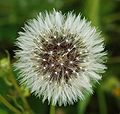Wikijunior:Biology/Life
Definition of Life
[edit | edit source]Scientists have come up with over a hundred different definitions of the term "life". Many definitions are similar. They usually belong to one of five categories. [1]
Definitions
[edit | edit source]- Enumeration of properties
Life is a system that has a metabolism, can grow, multiply and move as well as change through mutation. [2]
Definitions should help to avoid misunderstandings when working together. Scientists have therefore developed quality criteria for definitions.
With enumerations, a problem arises with classification if not all criteria are met. Enumerated definitions are of low quality.
-
Metabolism
-
Growth Rings
-
Seeds
-
Racing Automobile
-
Tulip with Mutation
- Matter and Energy
Life is a system of nucleic acids and polymerases that absorbs and processes substances and energy. [3]
The definition is limited. It relates to earthly life.
Some scientists suspect that there are life forms in space that use other substances.
-
RNA Polymerase
- Information
Life is a system that can absorb, process and deliver information and controls itself. [4]
The definition is wide. It does not separate biology from technology.
-
Information
- Themodynamics
Life is an unstable system that creates and maintains order within itself. [5]
This definition applies to other aspects of life: Living beings try to maintain order so they don't die.
That's true, but definitions are meant to be intuitive.
-
Entropie
The definitions listed distinguish between animate and inanimate.
In the following symbiosis-based definition, there is a graded transition. Organisms are a higher life form than unicellular organisms because they rely on more symbioses.
- Scientifically - philosophically
Life is based on symbioses, ie on cooperation for mutual benefit. Philosophical: Life is based on the principle of love. [6]
Principle-based definitions are of higher quality than adhock definitions.
This is a principle-based definition: symbioses form the basis of life. But biologists have different opinions on this question.
The symbiosis definition gives life an (ethical) value, which is important for doctors and lawyers. But many biologists strictly reject the use of philosophical terms like "love".
-
Clownfish with Sea anemone
-
African buffalo with cattle egret
-
Hummingbird with Plant
-
Crocodile with Plover
-
Ant with Aphid
-
Lichen: Mushroom with Algae
Life is diverse. Each of these definitions illuminates different aspects of life.
== Literature ==
- ↑ Poppa, Radu (2004). Between Necessity and Probability: Searching for the Definition and Origin of Life. Springer Verlag.
- ↑ Arrhenius, Gustav (2002). Short definitions of life.
- ↑ Kunin, Viktor (2000). A system of two polymerases – A model for the origin of life.
- ↑ Dyson, Freeman (1999). Origins of Life.
- ↑ Hennet, Remy (2002). Short definitions of life.
- ↑ Fröhlich, Klaus (2022). "Scientific-Philosophical Definition of Life". Science & Philosophy - Journal of Epistemology, Science and Philosophy. 10 (2): 188–205. doi:10.23756/sp.v10i2.801.














